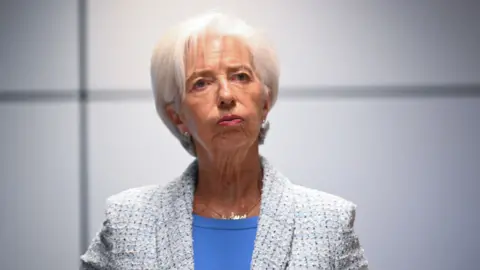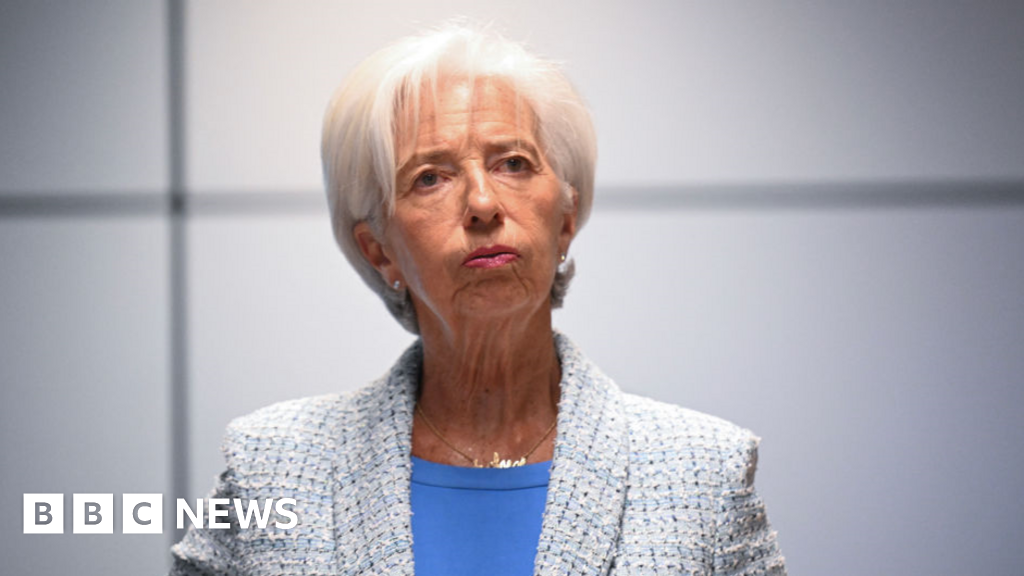Lucy Hooker,Business reporter, BBC News
 Getty images
Getty imagesThe EU has become the second major global economy to cut its lending rate this week.
The European Central Bank (ECB) announced a cut in its main interest rate from an all-time high of 4% to 3.75%.
That follows Canada’s decision on Wednesday to cut its official lending rate.
The ECB’s move comes as voters head to the polls for EU-wide elections over the next four days, with the outcome expected to reflect people’s unhappiness over cost-of-living pressures
Lindsay James, investment strategist at Quilter Investors said the move was widely anticipated but would nevertheless come as a relief to consumers and businesses on the continent.
“The ECB has stolen a march on the Bank of England and [US] Federal Reserve – who are both potentially still a few months away from cutting – and will breathe life into an economy that desperately needs some form of stimulus,” she said.
Central banks have kept rates high for the past two years to bear down on the rate at which prices are rising, with most targeting an annual inflation rate of 2%. But higher interest rates tend to dampen economic growth.
A cut in interest rates should boost economic activity by making it cheaper for consumers and businesses to borrow.
Meeting in Frankfurt on Thursday, the EU’s rate-setting body decided to cut rates, despite a slight uptick in inflation in May. Inflation rose to 2.6%, from 2.4% in April in the 27-nation bloc.
The ECB’s decision followed Canada’s rate cut on Wednesday which brought its headline rate down from 5% to 4.75%, after inflation there fell to 2.7%. Sweden and Switzerland have also trimmed rates.
Katherine Neiss, chief European economist at investment firm PGIM said she was “reasonably confident” that the ECB would cut rates further over the summer or autumn, resulting in eurozone rates that were at 3.5% or lower by the end of the year.
“Growth is encouragingly recovering from the recession that the euro area went through towards the end of last year, but it’s still sluggish,” she told the BBC’s Today Programme.
That factor, combined with slowing inflation and easing wage growth, would justify another rate cut, she said.
UK election ‘complication’
UK rates have yet to start coming down, although speculation is mounting that the Bank of England could trim them as early as this month.
UK inflation has fallen to 2.3%, a long way down from its peak of over 11% in late 2022.
Last month the International Monetary Fund suggested the Bank of England should cut rates from their current 5.25% to 3.5% by the end of the year.
However, George Godber from Polar Capital said the upcoming election in the UK would “complicate” the Bank of England’s next decision on 20 June.
The Bank is politically independent, but the Conservative government had made falling interest rates part of their promise to voters, which could influence “mindsets”, Mr Godber said.
“If they cut it’ll be political, if they don’t cut it’ll be political,” he said.
The US Federal Reserve is also expected to cut rates in the coming months, although the latest US inflation figure is higher, at 3.4%.
The Fed was likely to make its first move on rates ahead of the immediate run-up to voting in November, Mr Godber said.

